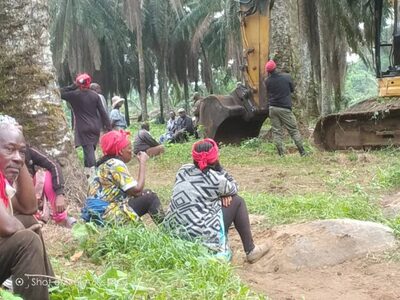News Upfront | March 28, 2025
Ancestral Land Under Siege: Apouh à Ngock’s Desperate Struggle Against SOCAPALM
The conflict between SOCAPALM and the community of Apouh à Ngock has taken a dark turn. Despite repeated attempts at dialogue, SOCAPALM has refused to listen.
Story by Louvier Kindo Tombe, Newsupfront.com
As the sun rose over the disputed lands of Apouh à Ngock, a sense of defiance filled the air. The local population, determined to protect their ancestral territory, had gathered to block the machines of SOCAPALM, the agro-industrial giant that had been replanting oil palms despite their objections.
But the company had come prepared, deploying over 30 armed security officers to clear the path.
“They were armed with guns, tear gas, and batons,” says Janvier EMATANE EMATANE, one of the victims of SOCAPALM’s encroachment in community land in Apouh à Ngock.
The standoff escalated into chaos as the security forces fired tear gas into the crowd, sending villagers fleeing for cover as the noxious fumes enveloped the area, leaving the elderly and children gasping for breath.
This is not the first time the community has faced répression. The chief of Apouh à Ngock, His Majesty Mercure Ditope Lindoume, a 2nd class chief who has been actively defending the community’s interests against SOCAPALM’s activities, was taken into administrative custody at the Edea Central Prison in 2023, highlighting the company’s disregard for local leadership and human rights.
The replanting project, which began in 2021, has been a source of contention.
“This is a very bad situation orchestrated by a company which has the RSPO (Roundtable on Sustainable Palm Oil) certification,” says Marie-Crescence NGOBO, Executive Secretary of RADD. “What has happened to social dialogue in Cameroon?”
RADD is a non-governmental organization (NGO) that focuses on promoting human rights, sustainable development, and social justice. It is known for its advocacy work, particularly in supporting communities affected by large-scale agro-industrial projects, such as those implemented by SOCAPALM.
SOCAPALM, a subsidiary of the Socfin Group, aims to rejuvenate its aging plantations, but this has come at the cost of ancestral lands and the livelihoods of local villagers.
“We can not afford to spend 50 more years of suffering from SOCAPALM,” an angry woman told News Upfront.
The company’s actions have been criticized for disregarding the rights of indigenous communities and perpetuating land grabbing, environmental degradation, and human rights abuses.
The villagers of Apouh à Ngock were expecting to reclaim their ancestral lands after the removal of old palm trees, as stipulated in the 2000 lease agreement between SOCAPALM and the Cameroonian government. Instead, the replanting has further restricted their access to land, exacerbating food insecurity and economic hardship.
The women of Apouh à Ngock who rely mainly on the disputed lands for subsistence farming and cultural practices, have been disproportionately affected, facing sexual abuse, land dispossession, and misery.
The Association of Women Neighbouring SOCAPALM Edéa Riverside (AFRISE) has also been at the forefront of the resistance, working in close collaboration with RADD, advocating for their rights and demanding that SOCAPALM cease its replanting activities.
As tensions continue to rise, the community remains resolute in its determination to protect its ancestral lands.
The population has vowed to die for their land, a stark testament to the depth of their conviction and the desperation of their situation.
“If they want to kill us, let it be,” says Janvier.
The international community has begun to take notice, with concerns raised about SOCAPALM’s operations and the broader implications for human rights and environmental sustainability.
As the conflict escalates, it remains to be seen whether SOCAPALM will finally listen to the community’s demands and find a peaceful resolution to this longstanding dispute.













